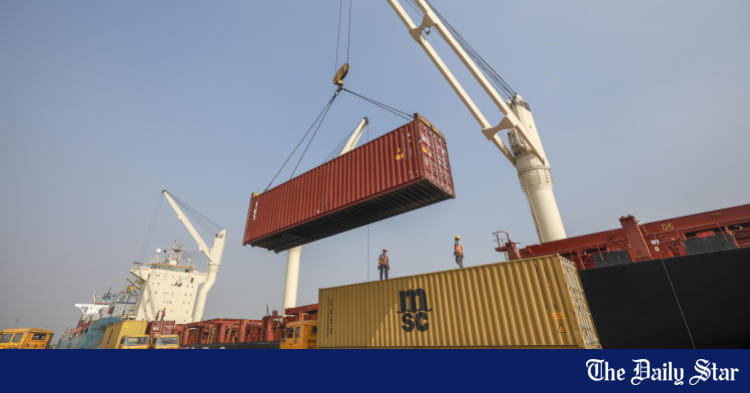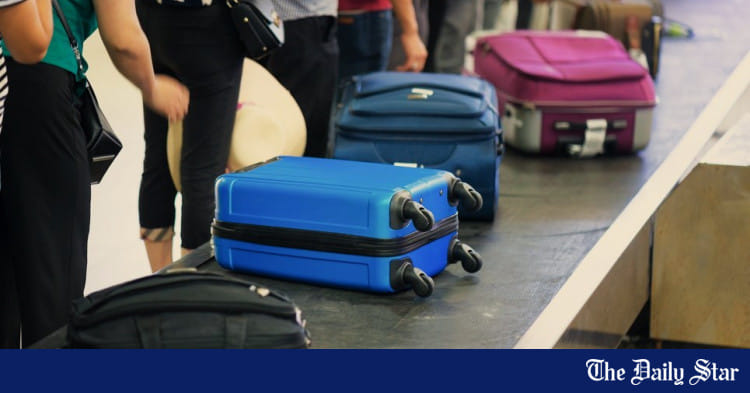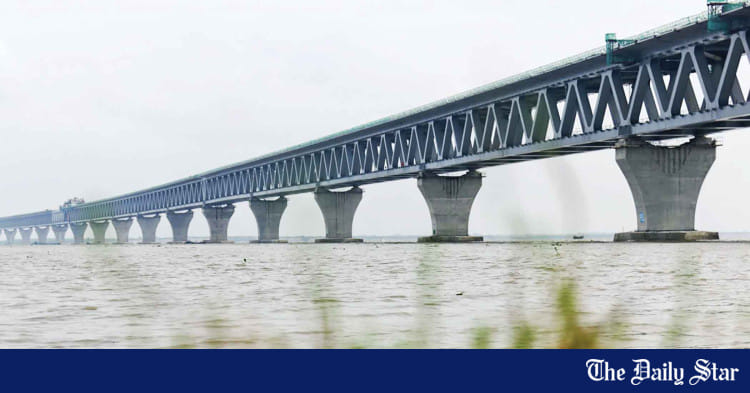- Copy to clipboard
- Moderator
- #26
- Jan 24, 2024
- 1,301
- 461
Here is a video log for Bay Terminal construction status - it is in tender stage now.
Explore Power, Politics, and the Art of War: Unraveling Power Plays and Political Warfare
Follow along with the video below to see how to install our site as a web app on your home screen.

Note: this_feature_currently_requires_accessing_site_using_safari




Fund-sapping motivated megaprojects may be axed
Ongoing large and megaprojects will be reviewed and less-priority and "politically motivated" ones scrapped, says Planning and Education Adviser Prof Wahiduddin Mahmud of the interim government. "There are irregularities in taking up projects as some are undertaken by the influence of the cothefinancialexpress.com.bd
Fund-sapping motivated megaprojects may be axed
Adviser indicates, as 'irregularities' galore
FE REPORT
Published :
Aug 20, 2024 00:36
Updated :
Aug 20, 2024 00:36
View attachment 7609
Ongoing large and megaprojects will be reviewed and less-priority and "politically motivated" ones scrapped, says Planning and Education Adviser Prof Wahiduddin Mahmud of the interim government.
"There are irregularities in taking up projects as some are undertaken by the influence of the contractors and some are by dishonest persons," he said while briefing journalists Monday at the Planning Commission in Dhaka.
"Each of projects needs to be reviewed and scrutinised, as mostly are in indiscipline state…. Firstly, there are problems in the negotiations with the lenders for the foreign-funded megaprojects," he said.
He emphasized release of the funds in the pipeline which are committed by some development partners as that would give a cushion to the foreign-exchange-reserves crisis.
"Some approved projects are yet to be started, some in the middle and some in the last stage…Some projects are politically motivated, which are pledged by the political leaders in their election constituencies," says the economist-turned-functionary of the interim government, installed following the fall of the Sheikh Hasina government.
Those projects which do not have priority and better outcomes have to be reviewed and have to be scrapped, he categorically said in resetting priorities.
Prof Mahmud suggests the PC officials scrap the projects which are approved but involve waste of money.
"There are lots of irregularities in project design, cost estimation and execution period. The irregularities could be for a lack of capacity and could be for the influence of the contractors."
Referring to what is billed highest unit-cost record in Bangladesh's road constructions, the Planning Adviser said since there were irregularities, especially in the infrastructure-related big projects, their cost and time have been overrun.
The last Awami League government took up some megaprojects of which few are completed and many still ongoing. The ongoing 10 megaprojects have received nearly Tk 510-billion allocations in the current fiscal year (FY) 2024-25 Annual Development Programme (ADP).
The Roopur nuclear power plant alone has got an allocation worth Tk 105.02 billion, MRT-6 Tk 19.75 billion, MRT-1 Tk19.42 billion, MRT-5 (northern) Tk 59.68 billion, Bangabandhu Rail Bridge construction project Tk 25.60 billion.
Besides, the ongoing Padma rail-link project has received Tk 35.44 billion, Dohazari-Ramu-Ghundum rail line Tk 14.53 billion.
Some other megaprojects, including the Matarbari port development, Pyra port development, Dhaka Elevated Expressway, Dhaka-Ashulia elevated expressway, Airport 3rd terminal, and Elenga-Hatikamrul-Rangpur 4-lane highway projects, are also going on.
In the meantime, Dhaka-Chittagong Highway, Joydevpur-Elenga highway, and Tunnel under Karnaphuli river megaproject have already been completed.
Professor Mahmud said sometimes the ministries take non-priority projects for constructing complexes and buildings which remain idle and unutilised now.
"There is direct link between the public expenditure and macro-economy as our main target at this moment is stabilising economy and curbing inflation. For this reason, we have to reduce development expenditure which will cut the budget deficit and bring down inflation."
In overall macroeconomic management, project implementation, expenditure, and development budget have a big role, the adviser notes.
"There are some questions about the figure on GDP, inflation and other statistics of the BBS. We will review those and try to establish a credible statistical body of the government."
Terming faulty the past government's higher public-expenditure policy for enhancing GDP of the country, Prof Mahmud said they had only run for enhancing the growth rather not for creating employments.
Higher GDP growth is not the only factor in the macro-economy--employment creation is very important, notes the economist in upending the past 'development' pursuit.
For enhancing the GDP growth, the last government earlier tried to invest more in infrastructure development, considering it "very prestigious".
"I have earlier said only the infrastructure development will be like a skeleton without flesh and blood if we fail to develop our manpower," he reminds
"If we make delay in implementing projects, then price and time will get extended. You know that time is a big factor in the economy."
Prof Mahmud adds: "Some people think that their projects should not be stopped after some expenditure. However, we should consider-- how more funds will be spent and how much return we will get."
The adviser instructed the IMED to make a report on reasons behind 3-4 times revision of the projects, changing design at the middle and any negligence there.




BD unlikely to reroute external trade through Indian ports
Bangladesh government won't encourage businesses to use Indian ports for rerouting export-import trade as no special facility comes therefrom and a local deep-sea port is forthcoming, sources say. Vessel traffic from the under-construction Matarbari deep-sea port is not far off now-its operation ithefinancialexpress.com.bd
Cargo diversion from Matarbari deep-sea port
BD unlikely to reroute external trade through Indian ports
India's ports go cool on offering any special facility compared to regional shipping hubs
Syful Islam
Published :
Aug 31, 2024 00:09
Updated :
Aug 31, 2024 00:09
View attachment 7975
Bangladesh government won't encourage businesses to use Indian ports for rerouting export-import trade as no special facility comes therefrom and a local deep-sea port is forthcoming, sources say.
Vessel traffic from the under-construction Matarbari deep-sea port is not far off now-its operation is expected by 2026.
Officials concerned also have taken such a decision as the Indian ports may not be able to offer to Bangladesh any special facility compared to the regional transhipment ports in Colombo, Singapore and Port Klang.
They also point out that deployment of a adequate number of feeder vessels between Chittagong and Indian ports would be necessitated by the mother- vessel operators to launch shipping service on this route.
It is not clear whether the mother-or feeder-vessel operators will agree to deploy vessels on this route by considering business prospects, they have said.
SM Mostafa Kamal, a joint secretary at the ministry of shipping, led a 13-member Bangladeshi delegation early July to visit ports in Chennai, Krishnapatnam, Vishakhapatnam, Kolkata and Haldia.
The familiarisation trip aimed at observing the technical feasibility, commercial viability, and infrastructure facilities at the Indian ports and to discuss what additional facilities they can offer if Bangladeshi businesses use the ports for external trade.
The Bangladeshi delegation undertook the visit to Indian ports as a follow-up to a decision made at the Indo-Bangla shipping secretary-level meeting held in Dhaka.
Mr Kamal told the FE Wednesday that, while visiting the ports, the delegation members asked the port authorities to let them know in writing what additional facilities can be offered to Bangladeshi businesses for carrying out third-country export-import business using the ports.
"However, one and a half months have passed by since their visit, but the Indian port authorities didn't communicate further," he said.
"We will hold a meeting of the delegation members soon and submit a report to the ministry," he added.
Mr Kamal thinks cargo diversion to Indian ports would entail a big loss for the Matarbari deep-sea port which is expected to start operation in a few years time now.
Bangladesh's total annual external trade now stands at some US$120 billion maximum of which is being transported through Chittagong seaport.
However, increased congestions at the Chittagong port few years back forced Bangladeshi traders to look for alternative routes to carry export-import cargoes in a faster way.
As such, the issue was discussed at the India-Bangladesh shipping secretary-level meeting in 2023. At the meeting decision was made on assessing the technical feasibility and commercial viability of using the Indian ports, the officials said.


New Kalurghat rail bridge project ready for ECNEC nod
The century-old Kalurghat Bridge over the Karnaphuli River is finally going to be replaced with a new one at a cost of Tk 115.60 billion, as the interim government is likely to approve the first railway project after reviewing its cost. Official sources said the rail-cum-road bridge project is setthefinancialexpress.com.bd
New Kalurghat rail bridge project ready for ECNEC nod
Munima Sultana
Published :
Oct 05, 2024 09:01
Updated :
Oct 05, 2024 09:19
View attachment 9199
The century-old Kalurghat Bridge over the Karnaphuli River is finally going to be replaced with a new one at a cost of Tk 115.60 billion, as the interim government is likely to approve the first railway project after reviewing its cost.
Official sources said the rail-cum-road bridge project is set to be placed in the next weekly meeting of the Executive Committee of National Economic Council (ECNEC).
They said the project of the Bangladesh Railway (BR) was selected among eight others of different ministries to be placed before the ECNEC on October 7 as the Planning Commission has found the cost acceptable after reviewing it recently.
An official said the BR had sent the Kalurghat bridge project to the ECNEC on July 1 after revising the Development Project Proposal as per guidelines of the PEC meeting held on April 18. The first estimated cost was Tk 130 billion.
The length of the bridge will be 11.44 kilometres, including 700-metre main bridge which will be a dual gauge double line. The viaduct will be 6.2 km long.
The Economic Development Cooperation Fund (EDCF) of South Korea which will fund Tk 71.25 billion has conducted the feasibility study three times since then due to indecision over the bridge's design.
The original metre gauge rail bridge is used as road bridge after road traffic was allowed on it in 1962.
The new bridge site has been selected 70 metres upstream of the existing bridge with a navigation height of 12.2 metres.
Good Looking bridgeThis was long overdue, the century-old bridge will be replaced with a modern one, while another one already exists. And of course there is the tunnel closer to the port, airport and old EPZ areas. In my estimation, they need at least three bridges over the Karnaphuli in various points up and downstream nearer the mouth of the Karnaphuli, but two will fill in for now.
Shah Amanat Bridge also known as Karnaphuli Bridge is the second constructed across the Karnaphuli River in Bangladesh, is the first major extradosed bridge in the country.
View attachment 9335




 www.newagebd.net
www.newagebd.net



